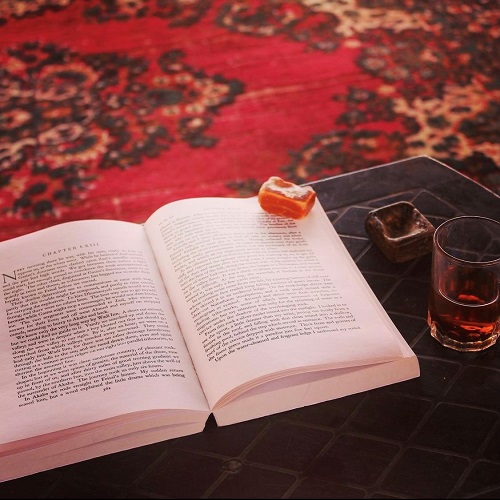You are here
- Home
- Conferences
- Reading for/and Escape: an online conference (registration now open)
Reading for/and Escape: an online conference (registration now open)
Dates
Thursday, March 17 - 09:45 to Friday, March 18, 2022 - 20:00
Location
Microsoft Teams
Registration
Registration is now open via Eventbrite here
Organised by The History of Books and Reading (HOBAR) Research Collaboration, English & Creative Writing, The Open University and supported by SHARP (The Society for the History of Authorship, Reading and Publishing)

‘Reading was my escape and my comfort, my consolation, my stimulant of choice’. Paul Auster
‘Reading is escape, and the opposite of escape’. Nora Ephron
‘When you read a great book, you don’t escape from life, you plunge deeper into it’ Julian Barnes
‘I realise that often in life I’ve considered books as portable islands, in the way they grant isolation from one’s surroundings, offering relief from immediate demands and space for contemplation.’ Gavin Francis
‘I think that pretty much every form of fiction… can actually be a real escape from places where you feel bad, and from bad places’. Neil Gaiman
‘By reading narrative, we escape the anxiety that attacks us when we try to say something about the world’. Umberto Eco
The ability of books to mentally transport their readers away from the problems and challenges of everyday life is well established. And yet, reading for escape (rather than self-improvement) has often attracted moral censure for being self-indulgent and wasteful. Despite the plethora of influencers on social media with their lists of ’10 escapist books to take your mind off the madness’, in academia, reading for escape (and escapist fiction) has often been derided for being beneath serious intellectual enquiry: the main questions around how, why, where, and when people read for escape and to escape remain critically underexamined. Does reading for escape allow for temporary mental respite and therefore offer a safety valve, a way or normalising profoundly abnormal or traumatic circumstances? Or is reading for escape actually a way of re-engaging with the world around us? This conference will encourage participants to interrogate both reading for escape as an instrumental practice, as well as reading and escape as a series of cultural or personal associations. Topics for discussion will include:
- reading as mental escape during physical confinement (imprisonment, house-arrest, quarantine, sickness or mental or physical rehabilitation).
- reading for escape during armed conflict, natural disasters, or personal trauma.
- reading as mental escape from the banality or tedium of everyday life.
- reading as means to acquire knowledge in order to escape violence, detention or capture;
- the interrogation of long-established critical prejudices against escapist reading.
- reading for escape as a psychological displacement activity.
- reading for escape during the current COVID-19 pandemic.
- exploring the genres of escapist fiction: romance fiction, pulp fiction, science fiction, fantasy, gothic, detective fiction, spy fiction, speculative fiction.
- reading for escape as a means to re-engage with reality.
- books on the run – readers who have made great escapes with their books.
- examining beach reading and holiday reading: is it escapist or immersive reading?
- reading as a means to escape socioeconomic, gender, class, race or other forms of discrimination or disadvantage.
- fictional, visual or cinematic representations of reading and/for escape (‘the book that got me out’ etc)
- reading for escape as an intertextual, multimodal or transmedia activity.
Conference programme
The full conference programme is now available in PDF form here. This includes the schedule, details of panels, presentation abstracts and speaker biographies.
A copy of the call of paper details are available in PDF form.
Registration
Registration for the conference is now open. The conference will be on Microsoft Teams; attendees must register through Eventbrite in advance to receive their Teams meeting links. Attendance is free and open to all.
If you are active on Twitter and tweeting about the conference, please use the hashtag #readingforescape and tag the following Twitter accounts: @OU_FASS @Shaf_Towheed @DrSallyBD @SHARPorg
Contact

Dr Shafquat Towheed (organiser), Shafquat.Towheed@open.ac.uk
Dr Sally Blackburn-Daniels (co-organiser), Sally.Blackburn-Daniels@open.ac.uk
This free online conference is organised by the History of Books and Reading (HOBAR) research collaboration in the Department of English & Creative Writing, Faculty of Arts and Social Sciences (FASS), The Open University, and supported by SHARP (The Society for the History of Authorship, Reading and Publishing).
Contact us
Faculty of Arts and Social Sciences,
The Open University.
E-mail:
Shafquat Towheed
Edmund King